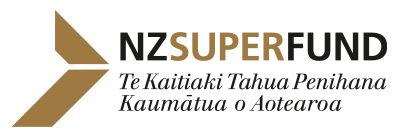Media statements
Exclusion of Companies involved in manufacture of Cluster Munitions or Nuclear Explosive Devices (12 December 2008)
POSTED ON: 12 December 2008
Share:
Auckland (12 December 2008) - The Guardians of New Zealand Superannuation today announced that they were excluding from the New Zealand Superannuation Fund companies associated with the manufacture of cluster munitions and the manufacture or testing of nuclear explosive devices.
The Fund will divest from stocks in six companies involved in the manufacture of cluster munitions, one of which is also involved in the simulated testing of nuclear explosive devices. The Fund will divest from another company involved in simulated testing. The Fund does not, and has never, held shares in any company that manufactures nuclear explosive devices. The total value of the Fund's shares in these companies is approximately $37 million, or 0.3 percent of the Fund's portfolio. The table at the end of this document provides the full list of companies involved.
"Today's announcement follows the New Zealand Government joining with 93 other nations in signing an international treaty banning the production or use of cluster munitions, and a comprehensive review of the nuclear weapons issue. We will continue to review our portfolio through our specialist screening agencies to ensure our list of excluded companies remains up-to-date," said Guardians Chief Executive Officer Adrian Orr.
The Guardians are required to invest the Fund in line with best-practice portfolio management, to maximise returns without undue risk, and to avoid prejudice to New Zealand's reputation as a responsible member of the world community.
The Guardians have a Responsible Investment Policy that is based on this. If a responsible investment issue arises, the Guardians prefer to try and influence the practices of companies through engaging directly as a shareholder, and by exercising their voting rights. However, under certain circumstances, divestment and exclusion are considered. Past exclusions have included companies involved in landmines, whaling and tobacco.
"Today we are following through with the commitment we made earlier this year," said Mr Orr. "We said then we would exclude companies involved in the production of cluster munitions once an international treaty was signed.
"Our review of companies associated with nuclear weapons programmes again applied the principles and rules of our Responsible Investment Policy."
The Responsible Investment Policy guidelines consider the effect of the Fund's investments on New Zealand's international reputation, the investment practice of global peers, and key international treaties, New Zealand law, and relevant Crown actions.
"It is clear that the manufacture of nuclear explosive devices would be illegal under the New Zealand Nuclear Free Zone, Disarmament, and Arms Control Act 1987. Those activities are undertaken by governments and controlled by the Non-Proliferation Treaty" said Mr Orr.
"We also believe that the simulated testing of nuclear explosive devices is critical to the development of those devices. We have therefore decided to exclude from the portfolio companies involved in such testing. This will require our fund managers to divest from holdings, totalling approximately $13 million, in two such companies.
"What has been more difficult is our decision on companies that are in some other way involved in nuclear weapons programmes such as in manufacturing delivery systems or in managing military bases.
"New Zealand's Nuclear Free Act specifically excludes delivery systems from its definition of nuclear explosive devices, and so those activities appear to be exempt from a ban under that Act.
"Our review also considered the investment practices of our peer funds as a gauge of the effect of our decisions on New Zealand's international reputation as a responsible member of the world community. We found that investment in companies involved with delivery systems or bases is commonplace amongst other funds. Other government funds like ours around the world hold these investments.
"It is also common for governments, including New Zealand's, and consumers to have commercial dealings with those companies. For example, both majority government-owned Air New Zealand and New Zealand's defence force buy aircraft and other products from some of these companies.
"The New Zealand Government's international agreements on disarmament have also been directed at countries, not companies.
"We therefore don't see these investments as damaging New Zealand's international reputation or conflicting with Crown actions," said Mr Orr.
"Many of the companies we identified produce products we use every day. These include, for example, aircraft, fire alarms, and elevators. Some of these companies are also involved in renewable energy technologies such as fuel cells and zero-emission hydrogen buses. This highlights how complex these decisions are.
"We realise many New Zealanders feel deeply about this issue. Following a careful consideration of our mandate and by applying the principles and rules of our Responsible Investment Policy, we believe we have made the right decision to focus our exclusions on companies that are involved in the manufacture or testing of nuclear explosive devices," said Mr Orr.
- Ends -
For more information please contact: Jolene Stack, Communications Administrator on 09 373 8963 or 09 300 6980.
Notes for Editors:
For further information please see our Responsible Investment section of our website.
For further information on the Cluster Munitions Convention please go to www.clusterconvention.org
